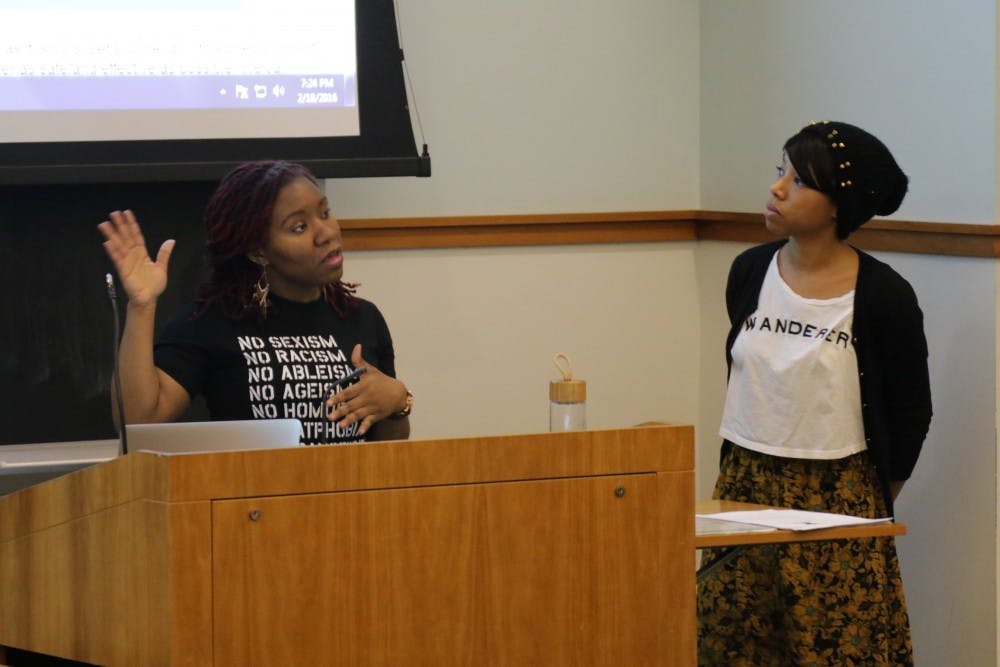The Sexual Assault Resource Unit (SARU) and Alpha Phi Alpha fraternity co-hosted a talk entitled “Relationship or Not: Let’s Talk About Consent” on Thursday. Ashley Hobbs and Sherine Powerful, members of Black Women’s Blueprint, a Brooklyn-based social justice organization, led the discussion.
Founded in 2008, Black Women’s Blueprint (BWB) tackles child sexual abuse, economic inequality, police brutality and mistreatment of prisoners through policy reformation and historical documentation. BWB also promotes its mission through social activism.
Members attended the trial of convicted rapist Daniel Holtzclaw in January to show support for the survivors of his crimes. BWB also works with local college students, educating them about various human rights issues.
Junior Christine Fei, the event co-chair of SARU, discussed why Hobbs and Powerful were chosen to speak at the event.
“I think Sherine and Ashley are really great speakers,” Fei said. “I think this is a conversation that maybe doesn’t happen — definitely doesn’t happen as often as it needs to on this campus — and especially doesn’t happen with women of color or a black woman leading it, which is a pretty big oversight.”
The interactive presentation was the first part of a three-part series aimed at college students and designed to increase understanding about consent, in particular through the lens of race and culture.
Hobbs and Powerful began the talk by asking the students to create “community agreements” by which they abide in order to create a safe environment for attendees to share their thoughts. Hobbs said the talk would be different from a normal lecture and that the unusual structure would help students better connect with the concept of consent.
“We designed all of our workshops and trainings to be conversational. We come with our analysis to provide clarity and a baseline but ultimately we want to facilitate students having their own "Aha!" moments about these topics because us just telling them consent is important won't do it,” Hobbs said. “We're providing a safe space for students to process what they're hearing, what they've experienced and what they're learning to come to their own well-informed conclusions and a higher level of consciousness and action.”
Hobbs and Powerful then asked students to participate in a group activity. Attendees stood in a line and listened to Hobbs and Powerful read various statements. Students moved from one end of the room to the other depending on whether students agreed with the statements being read.
Using the activity as a tool, a dialogue about consent and the limits of consent was opened up. Students discussed their experiences with consent in relation to their cultural or racial backgrounds.
Hobbs and Powerful discussed the student sexual misconduct policy at the University of Michigan, which directly address the different struggles faced by women of color in situations of sexual violence. Hobbs said she felt black rape victims were different because of their cultural backgrounds.
“As a black woman I can speak to the fact that within the black community conversations about sex are generally taboo. And when we're talking about rape and sexual assault, there's always the question of ‘What did you do for this to happen to you?’” Hobbs said. “We're getting better in some ways but victim-blaming is still so prevalent and that's one of the things we're pushing back against with our workshops and trainings.”
Junior Isis Dwyer thought the event was worthwhile, but more men should have attended.
“I think it was really great... I’m excited we’re having this conversation on campus,” Dwyer said. “I think that we had a pretty good mix of representation. I wish we had a little more gender representation, but other than that I think we did a pretty good job with who was here.”
Dwyer felt the interactive component of the talk helped communicate the message of consent.
“The interactive part of it, just really getting us to talk was more effective than anything they could have said because hearing it come from us and then hearing it reflected in their presentation was really powerful,” Dwyer said.
Sophomore Talia Schulder said that she wished the administration made people come to these events so that they could learn and change their problematic and offensive views.
Editor's Note: The original reporting of Talia Schulder's comments did not entirely communicate her thoughts. Her quote has been paraphrased to better reflect her opinion.





